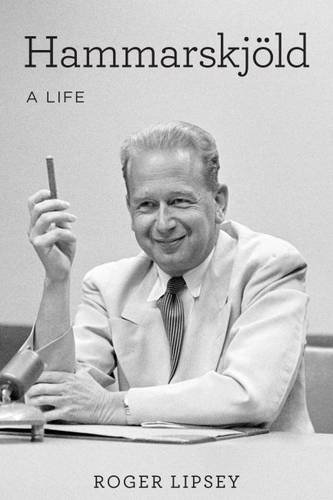
Hammarskjöld
A Life
کتاب های مرتبط
- اطلاعات
- نقد و بررسی
- دیدگاه کاربران
نقد و بررسی

March 11, 2013
Lipsey (Angelic Mistakes) revisits the legacy of the Swedish diplomat and thinker 50 years after he perished in a plane crash while on a secret mission in Africa. Youngest son of an aristocratic family, Hammarskjold held top posts with the Swedish government before the UN recruited him to succeed Trygve Lie in 1953. Lipsey tackles the tricky question of Hammarskjold's private life: the fact that he was a "confirmed bachelor" and good friend of poet W.H. Auden generated widespread speculation; denial was the only option at the time. Like Henry David Thoreau, Hammarskjold preferred solitude and kept a journal that posthumously became the bestseller Markings. Lipsey views his subject as a man of deep faith who showed remarkable courage in the face of numerous Cold War crises, and his spirit lives on at the UN thanks to the Room of Quiet, a sanctuary built during his tenure. Meticulously researched, new evidence shows that his death may have been an assassination, an interpretation sure to intrigue conspiracy theorists. Murky scandals aside, political junkies and history buffs will relish this definitive, painstakingly thorough treatment of a great statesman and consummate diplomat. 20 b&w halftones.

Starred review from February 15, 2013
A monumental life, spiritual and intellectual more than purely biographical, of the great Swedish diplomat and author. Dag Hammarskjold (1905-1961), writes Lipsey (Angelic Mistakes: The Art of Thomas Merton, 2006, etc.), was "formidable in his time, somewhat forgotten now." The second secretary general of the United Nations, he was also an author of note whose book Markings sold widely across the world--and, the author is careful to record, some 185,000 copies in its first six months in the United States. Lipsey makes a convincing case for why Hammarskjold should not be "somewhat forgotten": His spiritual yearnings and conviction that the U.N. could serve as a vehicle for true Christian compassion may seem a touch arcane now, but his activist stance and equal conviction that all humans are indeed created equal lend the office and institution a certain nobility. Lipsey argues that, more than mere inspiration, Hammarskjold, once a diplomat with an economic portfolio, brought useful specific ideas to the business of international human rights, among them the importance of sanctuary and his capacity for "lightning-like" assessment of unfolding crises. He died a half-century ago in one such crisis, in the Congo, where an ugly civil war was raging; Lipsey devotes a considerable number of pages to this conflict as a kind of exemplar of all the things the U.N. is meant to ameliorate. Another episode he covers thoroughly is of current interest again more than 50 years later, namely the flight of the Dalai Lama and the Chinese invasion of Tibet, which the U.N. could not satisfactorily resolve. A good and indispensable man, Hammarsjkold "understood and respected the need for heroes." In this lucid, well-written biography, he certainly emerges as one.
COPYRIGHT(2013) Kirkus Reviews, ALL RIGHTS RESERVED.

April 15, 2013
Dag Hammarskjold was UN secretary-general from 1953 until his death in 1961, a crucial period in the development of the organization and the post-World War II international system. Lipsey's (The Spiritual in Twentieth-Century Art) skill in tracing spiritual consciousness is well applied to Hammarskjold, whose posthumously published book of reflections, Markings, is a frequent source here. Hammarskjold's moving sense of moral calling forms a fine counterpoint to his UN work. Lipsey describes the innovative UN Emergency Force (UNEF), created after the Suez crisis of 1956, and the secretary-general's tireless efforts for peace in postcolonial Belgian Congo. The results here balance material on the violent politics of the Middle East and African decolonization with material on the devotion of a statesman who never seems to have parted from his worn copy of Thomas a Kempis's The Imitation of Christ. Ultimately Hammarskjold's UN efforts would lead to his death in what is now considered a probable assassination. VERDICT Hammarskjold's reserved personality prevents Lipsey from employing the familiarity of earlier biographers, e.g., Brian Urquhart, who actually worked with Hammarskjold, but such detachment is perfectly appropriate. This scholarly book will be of interest to serious readers in any of its intertwined themes.--Zachary Irwin, Behrend Coll., Penn State Univ., Erie
Copyright 2013 Library Journal, LLC Used with permission.

























دیدگاه کاربران